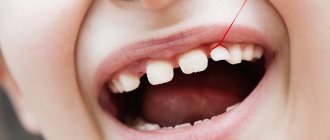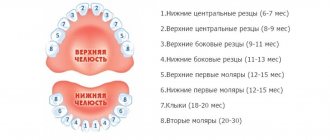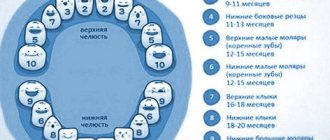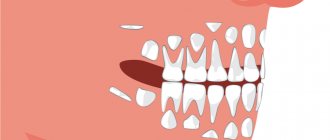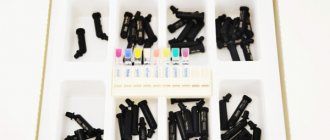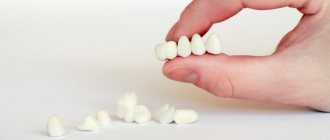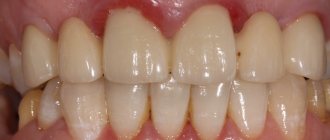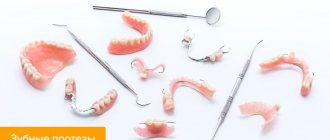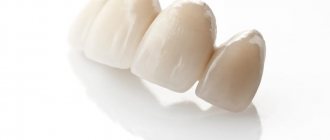A variety of children's crowns
There are two types of crowns for baby teeth: metal and composite (strip crowns). Metal structures are made from different materials, for example, steel or an alloy of nickel and chromium. They are widely used in the field of children's prosthetics; they are used to restore chewing teeth.
From a set of standard designs, the dentist selects the most suitable option and adjusts it to the shape of the tooth. Among their disadvantages are the possibility of an allergic reaction and poor aesthetics.
Features of dental prosthetics in children
Children's dental prosthetics has its own nuances. Firstly, in adults the jaw is formed, while the child is growing all the time, and the dentist must do everything possible to ensure that the prosthetics of baby teeth does not disrupt the development processes in the body. Therefore, dentures for children must be hypoallergenic, safe, comfortable, and resistant to chemicals. Therefore, for the manufacture of children's dentures, materials such as acrylic, chrome-plated steel, stainless steel, silver and tin alloys are used. Secondly, children's structures should not interfere with jaw development.
According to their purpose, dentures for children are divided into the following groups:
- therapeutic – restore functions and correct the structure of teeth;
- preventive – prevent deformations and pathologies in the development of teeth and jaws;
- fixing – used for fastening orthodontic appliances and therapeutic materials.
Interesting fact!
Hippocrates called children's teeth milk teeth. He was convinced that the first set of human teeth developed from the milk that infants fed.
Advantages of prosthetic crowns
Children's prosthetics is a relatively new area in the field of dentistry, which is becoming increasingly popular every year due to a number of advantages:
- Crowns provide reliable protection of tissues from destruction, which allows you to maintain the height of the bite and space for future molars.
- The designs allow you to maintain diction.
- There is no need to grind down the enamel.
- The likelihood of undergoing orthodontic treatment in the future is reduced.
- The products make it possible to restore chewing function.
Crowns for baby teeth from “NuSmile”
Prevention of dental prosthetics in children
Premature loss of baby teeth, and therefore dental prosthetics in children, can be avoided if you promptly and regularly visit a dentist who diagnoses the condition of the teeth, identifies possible bite defects and diseases of the oral cavity. Proper dental care and attendance at preventive examinations will eliminate the problem at the initial stage, avoid tooth loss and the need for prosthetics. The child’s nutrition also plays an important role in the preservation of baby teeth. After all, if there is a lack of substances necessary for a growing body, teeth are destroyed on their own, without mechanical impact on them. Currently, with busy parents and unfavorable environmental and economic factors, the condition of children’s teeth is worsening every day and prosthetics of baby teeth is becoming increasingly important. Therefore, preventive measures should be taken to maintain dental health from an early age.
Popular brands of children's crowns
Reliable products are especially popular. It specializes in the production of metal caps for primary teeth with a white composite veneer. This allows the structures to be installed on the cutters. Country of origin: USA.
Another, no less famous in America, produces composite products in a white shade, which is a guarantee of psychological comfort. Light-cured crowns “Protemp Crown” are also popular, which are distinguished by high aesthetics.
They are used for non-permanent covering of molars (with weak enamel) after eruption. Such products protect hard tissues from influence from external factors (for example, temperature changes and irritating components of some products).
In what cases should children not be given prosthetics?
Almost all children can get crowns. The only contraindication is increased sensitivity to the materials used for their manufacture, but such situations are extremely rare. And, of course, age - it is permissible to install prostheses for children aged 2-3 years and older (earlier - unless there are very serious pathologies).
In addition, a specialist will not install a denture for a child if the process of root resorption has already affected 50% of the tissue. This phenomenon begins about a couple of years before the tooth falls out on its own, so installing a crown is pointless.
What are strip crowns?
Strip crowns are transparent acrylic caps that allow you to create a highly aesthetic composite crown. They are firmly fixed in the oral cavity, they completely match the size and shape of your own teeth. They compare favorably with the conventional design with high aesthetics, speed and ease of installation, and affordable cost. At the same time, with their help it is possible to effectively protect molars and premolars from destruction and maintain the integrity of the dentition.
Strip crowns do not interfere with orthodontic treatment because they are securely bonded to the enamel. Their only disadvantage compared to metal products is fragility. They are not able to withstand increased chewing loads, so they are most often installed on the front teeth.
Dentures for teeth
| Type of prosthesis | Material | Characteristics |
| Crowns | Stainless steel, metal alloys, acrylic (Strip crowns) Metal alloys | They are used for partial dental caries damage, trauma, and bruxism. The procedure for installing such prostheses is much faster and easier than conventional filling. In this case, the pulp is preserved, and the tooth is ground according to the method for “adult” prosthetics. During the installation of the crown, the doctor must carefully ensure that the crown does not extend beyond the edge of the gum. Fixed crowns can be placed on children aged 1 to 12 years, as they do not interfere with the natural process of baby teeth falling out. |
| Pins | Metal alloys | The design of the pin for children's dental prosthetics is similar to the design of the pin for adults. The children's pin differs only in a special element for more reliable fixation. As a rule, pins are installed in the roots of the front teeth in the upper jaw and canines in the lower jaw. According to the generally accepted method, the preparation of the supragingival part of the root for subsequent prosthetic restoration with a pin is carried out with carborundum stones. |
| Tabs | Metal alloys | Microprostheses, which are installed in place of missing tissues and recreate the anatomical shape of the tooth. In prosthetics, baby teeth are used to eliminate defects with the obligatory preservation of the dental pulp. |
| Bridges | Stainless steel, metal alloys | A structure consisting of several crowns that is attached to natural teeth. Restores chewing function and preserves the aesthetics of the smile. |
| Immediate dentures | Acrylic, nylon | The most popular type of partial dentures. Used to replace one lost tooth. Almost invisible. It takes some getting used to. It is characterized by the absence of contraindications and is suitable for all patients without exception. |
| Clasp dentures | Nylon | Comfortable, ensure even distribution of load between all teeth. They exactly follow the contours of the gums and are therefore quite complex to manufacture and require several visits to the dentist. Elastic and flexible, they are fixed to adjacent teeth with soft nylon clasps. It takes some getting used to. They do not rub the gums and are almost invisible due to their transparency. |
| Complete overdentures | Acrylic, nylon | Completely replace all teeth on one or both jaws. They are attached to the palate by suction or using a special cream. They are durable and do not require special care. |
Indications for prosthetics
Crowns avoid tooth extraction. Among the main indications for prosthetics are:
- development of an inflammatory process in the periosteum;
- enamel hypoplasia, causing severe destruction;
- destruction of more than half of a baby tooth (as a result of carious lesions or mechanical trauma);
- periodontitis, due to which molars and premolars become loose and fall out;
- abrasion of enamel due to teeth grinding (bruxism).
Prices for dental prosthetics for children
The cost of prosthetics for primary teeth depends on the category of the clinic, the qualifications of the specialist, the amount of work of the dental technician and the material from which the prosthesis will be made. Moreover, the initial consultation with a pediatric dentist in most clinics is free.
| Type of prosthesis | Price |
| Removable denture made of acrylic | from 12,000 rubles |
| Bridge prosthesis | from 25,000 rubles |
| Clasp denture | from 30,000 rubles |
| Quadrotti removable denture without palate | about 32,000 rubles |
Preparation and installation process
Children's crowns are installed in one visit to the dentist's office. To avoid discomfort, all manipulations are performed under an anesthetic. Before installation, at the preparatory stage, the carious lesion is eliminated (using a drill). For control purposes, a marker is used - this is a liquid that intensively changes shade during contact with carious tissues.
After this, plaque is removed using a special brush and polishing paste. Hardware methods can seriously damage the enamel, so they are not used. The future design is selected before caries is eliminated. The shape and size of the molar or premolar to be restored is taken into account. No impressions are required. Below is an example of installing a strip crown. It takes place in several stages:
- isolation of the tooth from saliva with cotton rolls;
- shortening the structure by several mm using a diamond bur, which gives it a conical shape;
- minor grinding of healthy tissues (to maintain a natural bite);
- selection of product shade depending on the natural shade of enamel;
- filling the cap with composite (a small depression is formed so that most of the composite does not leak out of the structure);
- treating the tooth surface with acid (this significantly improves adhesion), after which it is washed and dried;
- putting on a cap;
- removing excess material with a spatula;
- illumination of the composite using a special lamp;
- smoothing and grinding of the crown.
The crown will fall out along with the tooth when the root resolves
Why choose prosthetics at Aza&Buka dentistry
Dental prosthetics for children is a responsible dental procedure. The doctor must take into account many points - characteristics of the bite, growth rates, the presence or absence of certain diagnoses. The prosthetic structure should grow with the child, be comfortable to wear and not interfere with the harmonious development of the patient.
At Aza&Buka, special attention is paid to the safety and quality of dental procedures. Prosthetics in pediatric dentistry is:
- Fast and comfortable. The doctor will conduct a diagnosis immediately during the appointment and select the optimal prosthetic option.
- Complex work of specialists. If necessary, the child will be examined by an orthodontist, a dental therapist, or a dental surgeon. The best decision for the patient will be made.
- Painless at every stage. For especially young children or complex patients, prosthetics will be performed under general anesthesia or deep sedation.
- High quality result. A crown will completely replace a damaged or missing tooth - aesthetically, anatomically, functionally.
- Modern equipment, best brands. Young patients will be offered ready-made dentures or crowns made from acrylic, nylon, ceramics, metal, and zirconium dioxide.
At Aza&Buka dentistry, we provide prosthetics for permanent and baby teeth for patients of any age.
Life time
There are no age restrictions on the use of products. After installation of the structure, it is necessary to visit the dentist’s office every six months to monitor the condition of the tooth and tissues. Metal products are durable, their service life corresponds to the service life of the primary molar itself.
During root resorption, they fall out along with the molar, without causing discomfort to the child. The service life of strip crowns is about 4-6 years. As a rule, this is enough until the permanent teeth begin to erupt.
Types of dentures for children
Typically, children are fitted with fixed, removable or conditionally removable dentures. Removable (temporary) dentures are made according to individual jaw impressions, sometimes with additional elements (screws, springs, arches). In children's dental prosthetics, they are installed when several teeth are missing to widen the jaw or correct the position of the teeth, and they must be regularly replaced as the child grows. Fixed dentures are installed for long-term wear and are removed along with the falling out milk teeth.
When can it be used
Children's crowns can be placed starting from the age of 2. Sometimes there are situations in which a specialist installs the structure earlier, for example, with congenital hypoplasia of the enamel layer. Each clinical case requires an individual approach, and determining the indications is within the competence of the doctor.
DENTAL PROSTHESIS ON 4 IMPLANTS - from RUR 170,000.
The price includes all procedures for installing Osstem implants (South Korea), including anesthesia and diagnostics.
Hurry up to sign up for a free consultation and fix your prices.
Call now or request a call
Opening hours: 24 hours a day - seven days a week
How is the prosthesis installed?
In general terms, the procedure can be described in the following steps:
- pain relief with individually selected means,
- cleaning the tooth surface from deposits,
- removing a thin layer of tissue from the chewing surface (but not much to preserve the integrity of the tooth),
- selection and fitting of the crown / or taking impressions if a laboratory manufacturing method is used,
- fixation of the crown with a permanent composition,
- sanding and adjustment if necessary.
The duration of the procedure is about half an hour - because the child will not be able to sit longer. That is why template models of crowns are most often used, which doctors have in stock for all occasions (meaning, for all types and sizes of teeth). If necessary, before installation, the doctor carries out treatment - removal of caries or even a nerve, if required.
How are crowns installed for children?
The installation process is simple. Our doctors have a set of crowns that are painlessly and quickly installed on the child’s prepared tooth.
First of all, the doctor removes caries from the tooth and puts on a cap - a crown filled with a special material.
Modern crowns are designed in such a way that no significant grinding is required before their installation, and tooth preparation takes a minimum of time.
The design of modern crowns intended for children's teeth is such that tooth preparation does not take much time.
Crown care
Diet and regular, proper oral hygiene are very important here. It is necessary to avoid hard foods that can lead to chipping of the crown - it is important to exclude crackers, dryers, and candies. If possible, it is also necessary to protect children from injuries and from bad habits of gnawing on everything. Yes, it will be difficult, but this is exactly what will allow you to keep your teeth with crowns safe and sound.
Author: Mikhailova (. M. (Thank you for your help in writing the article and the information provided)
When is it necessary to install a crown on a child’s baby tooth?
The dentist will suggest installing a crown if:
- the tooth is severely damaged (two or more walls have been destroyed by caries), and a regular filling will no longer save the situation.
- We are talking about a tooth with hypoplasia or other developmental defects - when the hard tissues of the tooth developed incorrectly.
- The child has pulpitis. This is the most common indication for crown installation. It helps to preserve the maximum volume of tissue and protect a tooth weakened by pulpitis from injury and chips.
- There is an active caries process in the mouth - several teeth are affected by caries at once.
How to care for children's teeth after dentures?
First of all, you need to thoroughly brush your teeth twice a day - after breakfast and dinner. The area around the crown should be cleaned carefully so as not to injure the gums. The main thing is to prevent the formation of soft plaque, as it can lead to gum inflammation. If your gums still become inflamed, contact the clinic without delay.
In the first 3-5 days after installing a crown on a child’s teeth, the following should be excluded from his diet:
- hard food
- sour foods (including freshly squeezed juices)
- hot food and drink
Why should you entrust your child’s teeth to us?
- The clinics of the Polident network have children's departments, which employ only experienced specialists in children's and adolescent teeth.
- Children's departments are equipped with the most modern equipment and materials for safe and high-quality dental treatment for your child.
- Under conditions similar to premium clinics, our prices are significantly lower.
- And the cost of all services is absolutely transparent and does not change during treatment.
Stock
